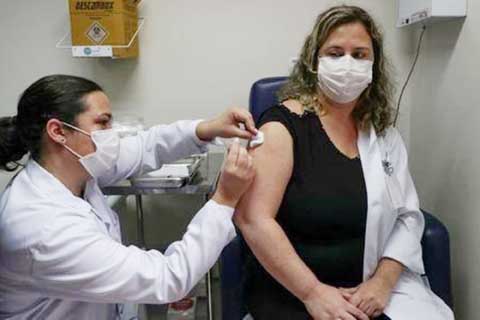
Reuters, Rio De Janeiro :
Brazil’s leader Jair Bolsonaro is moving to assert control of the nation’s independent health regulator, Anvisa, a move some health experts fear will politicize the agency and give the president, one of the world’s most prominent coronavirus skeptics, free rein over vaccine approvals.
Bolsonaro on Nov. 12 nominated a retired soldier, Jorge Luiz Kormann, to take one of Anvisa’s five director posts. Kormann, a former lieutenant-colonel with no background in medicine or vaccine development, would lead the unit charged with greenlighting vaccines. If he is confirmed by Brazil’s Senate, as is expected, Bolsonaro allies would occupy three of Anvisa’s five directorships, giving them a majority in all decisions taken by the agency.
“Anvisa is being stacked with directors who are allied to Bolsonaro’s denialist and irresponsible stance on public health,” said Alexandre Padilha, a former health minister and leftist federal lawmaker. “He wants to pass on a political message that only the vaccines he wants will be incorporated into the public health system.” Reuters interviewed more than a dozen current and former officials, state governors and lawmakers about Bolsonaro’s plans for Anvisa, an internationally respected regulator whose role in approving drugs, devices and treatments is similar to that of the U.S. Food and Drug Administration.
Many said they worry the president’s growing influence at Anvisa is politicizing the regulator, which will sign off on various different vaccines being tested in Brazil. Although they cited no specific evidence, some fear that Bolsonaro, with his eye on re-election in 2022, could use Anvisa approvals to speed vaccines to allies and withhold them from rivals.
Others fear that Bolsonaro’s hardening opposition to coronavirus vaccines will seep into Anvisa, undermine its credibility and stoke growing anti-vaccine fervor in Latin America’s largest country.
Anvisa said it was Bolsonaro’s prerogative to nominate directors, and the Senate’s job to confirm them. “Anvisa has no … participation in this process,” it said in a statement. It declined further comment.
The president’s office did not respond to requests for comment. The Health Ministry, where Kormann currently works as assistant deputy health minister, also declined to comment. Kormann did not respond to requests sent to his email.
Bolsonaro has repeatedly downplayed the severity of COVID-19 and touted the unproven malaria drug hydroxychloroquine, which he took when he contracted coronavirus in July. Late last month, he said he would not take any coronavirus vaccine that becomes available. Bolsonaro said refusal was his “right,” and that he did not expect Congress to mandate immunizations.
Public support for COVID-19 vaccinations is falling across Brazil, according to a November survey of residents of four major cities by polling agency Datafolha. In São Paulo, for example, 72% of respondents said they would get vaccinated, down 7 points from the previous month, while support for mandatory immunization fell 14 points to 58%.
Silvia Waiapi, an army second lieutenant who was until February the Health Ministry’s secretary for indigenous Brazilians, said she expects Kormann’s military background to strengthen Anvisa.
“The president is establishing order in the country and we see that things are being managed with extreme care at Anvisa,” Waiapi told Reuters.
However, Univisa, the association of Anvisa workers, and Sinagencias, the national union of regulatory agency employees, have both publicly opposed Kormann’s nomination due to his lack of relevant experience.
Brazilian presidents have always named Anvisa’s directors. But the agency traditionally has acted independently, and its directors have been chosen for their expertise, said current and former officials interviewed by Reuters.
In addition to Kormann’s inexperience, the sources interviewed by Reuters said they also worry about his proximity to Bolsonaro.
Reuters reviewed exclusive internal Health Ministry WhatsApp chats from June, when the ministry was engulfed in scandal after it abruptly stopped publishing comprehensive COVID-19 case and death data on its website. Kormann played a central role in the ministry’s effort to withhold those statistics, the chats show.

